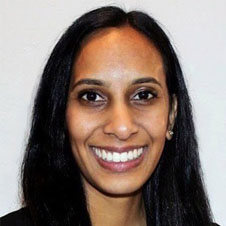The research one conducts as a medical student can further the body of knowledge used to improve patient outcomes. These scholarly pursuits also can shape careers and help bolster a residency applicant’s residency credentials.
Now a pediatrics resident at the Children’s Hospital of Philadelphia, Priya Shah, MD, offers insight on her journey as a medical student researcher.
Dr. Shah was a finalist in the 2021 AMA Research Challenge—the largest national, multispecialty research event for medical students, residents and fellows, and international medical graduates. The 2023 AMA Research Challenge is well under way. For those interested in viewing research produced by their resident and medical student peers, scoring for this year’s AMA Research Challenge takes place Oct. 18–20.
Medical student research retrospective: Priya Shah, MD.
Residency program: Children’s Hospital of Philadelphia.
Specialty: Pediatrics.
Medical school: Harvard Medical School.
How I got interested in doing medical research: As a student interested in medicine in both high school and undergrad, scholarly pursuits were a great ‘foot in the door’ to get exposed to more of the field. Participating in projects helped me witness more clinical practice, meet great mentors in pediatrics, and explore the intersection of other interests of mine—education, advocacy, etc.—with medicine.
My first foray into research in medical school: One of the first projects I worked on in medical school was evaluating ways to improve medical student well-being. A group of us turned to our fellow students themselves to nominate ideas to better our curriculum, dining, gym, library, dorm, student health services, and school environment to boost wellness.
Incorporating student voices into our project was a great way to gain buy-in both from our classmates as well as faculty, since our results came directly from the subject population that the initiatives would benefit.
My signature medical student research: The research project that I submitted to the AMA Research Challenge—a poster entitled “Trauma-Informed Care in Pediatrics: An Interactive Module for Clerkship Students” (PDF)—was my favorite project in medical school because I really got to take ownership of the creation, implementation and evaluation of the trauma-informed care curriculum I developed. It was an educational process to write—and tweak—learning objectives, design an interactive didactic session, and learn from the feedback I received to improve the curriculum.
Why research skills are essential in my specialty: An understanding of the scientific method and how research is developed is critical to any specialty; whether one chooses to then continue to perform research can be an entirely personal decision. Rather than pursuing basic science research or even clinical or translational work in the hospital, I see myself using research principles to guide and strengthen my interests in education and advocacy.
How much research I conduct in my day-to-day practice: While my clinical schedule is certainly busier as a resident physician than as a medical student, our program curriculum is set up in an “X + Y” manner. That is where every two-month block is set up as six weeks of busier rotations, such as working inpatient wards, in the ED, or ICU (“X” block), and then two weeks of outpatient clinic and didactics (“Y” block). This allows us to work in projects longitudinally as we have guaranteed elective time every outpatient “Y” block.
Barriers I encountered in conducting medical school research: It can be hard to come up with a unique project that will be impactful but that also avoids reinventing the wheel and duplicating work that has already been done. This is where performing a detailed review of literature, asking mentors about existing initiatives or research on campus, and collaborating with like-minded individuals can be instrumental.
How I have identified research mentors: I found attending physicians who I enjoyed working with and learning from in the clinical setting, and then asked them to serve as my research mentors on projects that aligned with their clinical and research interests. For example, I worked with my pediatrics clerkship director to implement my trauma-informed care curriculum into the didactic schedule for clerkship students.
What I would do differently as a medical student researcher: When I think back to the research I did as an undergraduate student, I would recommend keeping a daily journal with thoughts from the day. These can be reflections on failed steps in a bench-research project or could be jotting down a memorable conversation with a patient in a clinical research project. Down the road, when you are writing up a paper or talking about the project in an interview, reviewing these specific stories can help you write or speak about the research in a more meaningful and detailed way.
How lessons learned doing research were applied to practice: As simple as it sounds, doing research will help you understand research on a much deeper level because you will have experienced the questions, missteps, and critical thinking that comes with performing research. Every section—from background to methods to results to discussion—can be better understood once you have the experiential knowledge of doing it yourself.
Advice for medical students with designs on publishing: Starting out with very concise, measurable objectives helps to shape a project that is easily understandable, well-organized, and that has a clear takeaway. A thoughtfully structured project from the get-go leads to a smoothly running project which then can be more easily transformed into a well-written and impactful publication or poster.
General advice for student researchers: Picking a topic you are interested in—whether for personal or academic or any other reason—and finding a reliable, responsive mentor are two key ingredients in a successful research project.
As applicants embark on the residency-selection process, no online resource contains as much information as FREIDA™, the AMA Residency and Fellowship Database®, which includes more than 13,000 Accreditation Council for Graduate Medical Education-accredited residency programs, and offers a streamlined user experience.




